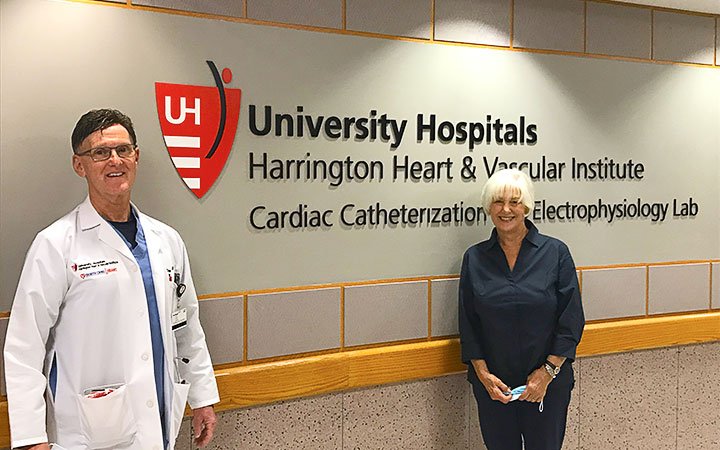Four Years Post-Heart Attack and Still Going Strong
September 28, 2020

Cheryl Ryan, 71, of Elyria, has always been active. Even after retiring from a 40-year career in insurance, she took Zumba classes and walked five to seven miles nearly every day of the week.
But on July 23, 2016, she woke up in the middle of the night with a heaviness on her chest. Initially she chalked it up to stress and being a generally nervous person. Soon after, however, the pressure she felt indicated otherwise. So she asked her husband to take her to the hospital. His decision to call 9-1-1 instead saved her life.
Heart Stops Beating
Elyria Fire Department No. 4 arrived at their home within minutes and began evaluating Cheryl’s condition. She was able to walk out of her home and into the ambulance, but her heart stopped beating shortly after she arrived at UH Elyria Medical Center's emergency department.
UH Elyria emergency physicians were waiting for Cheryl and gave her cardiopulmonary resuscitation while interventional cardiologist Charles O’Shaughnessy, MD, prepared to perform a heart catheterization. Cheryl’s left anterior descending artery – the largest coronary artery in the body – was 100 percent blocked with plaque. To correct the issue, Dr. O’Shaughnessy performed an emergency percutaneous coronary intervention with stent implantation, which restores blood flow. A second procedure was performed two days later to implant stents to restore blood flow to two of Cheryl’s other coronary arteries that were severely blocked.
Don’t Wait – Call 9-1-1
“Cheryl’s case demonstrates the need for getting immediate attention if you or a loved one are experiencing signs of a heart attack,” Dr. O’Shaughnessy says. “If she would have waited longer, she would have gone into cardiac arrest at home, where medical attention wasn’t readily available.
“It’s also very important to call 9-1-1 rather than drive yourself or a loved one to the emergency room," he says. "Paramedics are trained to begin care immediately and continue that care en route to the ER. If Cheryl’s abnormal heart rhythm happened in car, she may not have survived.”
Still Going Strong 4 Years Later
Luckily, Cheryl received the immediate, life-saving care she needed at UH Elyria Medical Center, and today has no post-cardiac event issues. Just three days after her heart attack, Cheryl went home from the hospital. A short three weeks later, she was back to walking her dog. Today, she is back to walking five to seven miles, five to six days each week. She sees Dr. O’Shaughnessy twice a year for routine check-ups.
“I have been going to UH Elyria for 50 years,” Cheryl says. “My husband and I and our entire family extend our gratitude to the Elyria Fire Department, UH Elyria emergency department staff, the eighth floor cardiovascular unit and North Ohio Heart staff. I know I am alive today as a result of the efforts and quick actions of these dedicated and compassionate men and women. Elyria is very fortunate to have these top-notch emergency and UH medical professionals.”
Tags: Atherosclerosis, Cardiac Arrest


